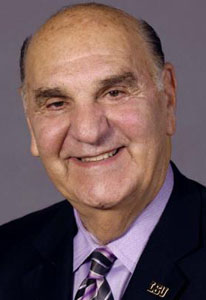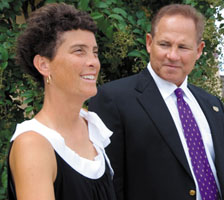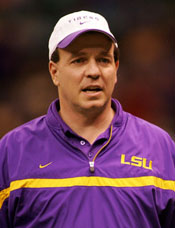LSU Short Story
Scott Rabalais, The Fighting Tigers 1993-2008: Into a New Century of LSU Football (2008)
It was an emotional farewell in Orlando on New Year's Day 2005 as the LSU Tigers lost in the Capital One Bowl in their last game under Nick Saban. It was an emotional day in Stillwater, OK, as well, as Kathy and Les Miles and their four children were going house to house, telling the Oklahoma State assistants of Les's decision to go to LSU.
LSU's 30-25 last play loss to Iowa wasn't the only big postseason letdown. It was preceded on December 29, when Miles's Oklahoma State team was routed by Ohio State 33-7 in the Alamo Bowl in San Antonio. LSU athletic director Skip Bertman had flown to San Antonio on December 26 to interview Miles, who was just completing his fourth season in Stillwater. Miles was definitely interested, but as with the Tigers and Saban's imminent departure, the reports and rumors surrounding Miles apparently weighed on the Cowboys and hampered their efforts against the Buckeyes. "I've got to be honest," Miles said. "I was distracted. I did nothing differently. I worked harder to prepare. I realized that it was a distraction for my team, especially by game day. It was everywhere that I was in contention for the job." By game's end, Les and Kathy figured LSU's interest in Miles had cooled. "In the world of football you're usually about as good as your last game," Kathy Miles said. "When you take a beating like we did from Ohio State, we were both thinking, 'Nah, LSU probably won't call again."
Since this was the first LSU football coaching search Team Miles was involved in, they probably didn't realize how bizarre those searches could be. First, there was a strange non-interview in Daytona Beach on New Year's Eve with Jacksonville Jaguars coach Jack Del Rio, who refused to meet with LSU officials face-to-face for fear of what it would do to his status with the NFL team. Del Rio went back to Jacksonville and LSU officials went back to Orlando, both sight unseen. Then there was the evening Skip Bertman's wife, Sandy, answered a call in their Orlando hotel room - a call from former president George H. W. Bush. "She gave me the phone and I said, 'Mr. President,'" Bertman recalled. "He said, 'I normally don't get involved, but I'd like to recommend somebody." So, on a former president's request, Bertman met with former Texas A&M coach R. C. Slocum. "He's a man's man, a gentleman," Bertman said of Slocum. "But we wanted a sitting head coach."



L-R: Skip Bertman, Les and Kathy Miles, Jimbo Fisher
An interview with Bobby Williams, Saban's wide receivers coach and one-time successor at Michigan State, was basically a courtesy. Bertman tested the waters with former Miami Hurricanes and Cleveland Browns coach Butch Davis, Iowa coach Kirk Ferentz, USC's Pete Carroll, and Oklahoma's Bob Stoops before settling on two main candidates: Miles and Louisville coach Bobby Petrino. Petrino failed to impress the interview committee when they met December 26, leaving Miles as the primary candidate. "You have to be comfortable with the coach. I felt real comfortable with him," Bertman said of Miles, "and so did the others on the [selection committee]. He was upbeat, enthusiastic. And he knew a lot about LSU." Miles had just signed a contract extension with Oklahoma State that would take him through 2011 and pay an average of $1.5 million per year plus a handsome annuity. "Do you know what I'm giving up here, Coach?" Miles asked Bertman. Bertman replied, "Coach, I won some baseball national championships, but my legacy here will be with Les Miles, good or bad. I'm in this thing with you. You've got to trust me, and I've got to trust you."
On January 2, Kathy and Les Miles and his agent, George Bass, flew to Baton Rouge to work out details of his contract that would initially pay Miles $1.25 million per year plus $200,000 per year paid into a deferred account. But it was much more than money that led Miles to LSU. "The grand scope of the success this place can have," Miles said at a January 3 news conference, "the ability to recruit for and compete for national championships very quickly, my competitive spirit would not let me say no." Miles's first competitor would be the specter of Saban's success, a ghost the new coach didn't shy away from. "The goal - and Coach Saban set it up for us - is to run the finest football program in the country so our guys will have an experience second to none."
Miles would have to fight Saban to keep some of his former assistants. Four of them - defensive coordinator Will Muschamp, running backs and special teams coach Derek Dooley, defensive line coach Travis Jones, and Williams - followed Saban to Miami. Saban offered offensive coordinator Jimbo Fisher a noncoordinator position, so Fisher remained at LSU. The only other coaches staying were offensive-line coach Stacy Searels and strength and conditioning coach Tommy Moffitt. Miles lured Karl Dunbar, an LSU player from 1986 through 1989 and an assistant for him at Oklahoma State, from the Chicago Bears to coach defensive line. Coming from Oklahoma State would be tight ends and recruiting coordinator Josh Henson, defensive backs coach Doug Mallory, wide receivers coach Todd Monken, and running backs coach Larry Porter. Bo Pelini left a co-defensive coordinator position at Oklahoma to run the defense for Miles, while Bradley Dale Peveto came from Middle Tennessee State to coach linebackers and special teams. Mack Butler, also from Oklahoma State, joined Sam Nader as administrative assistant.